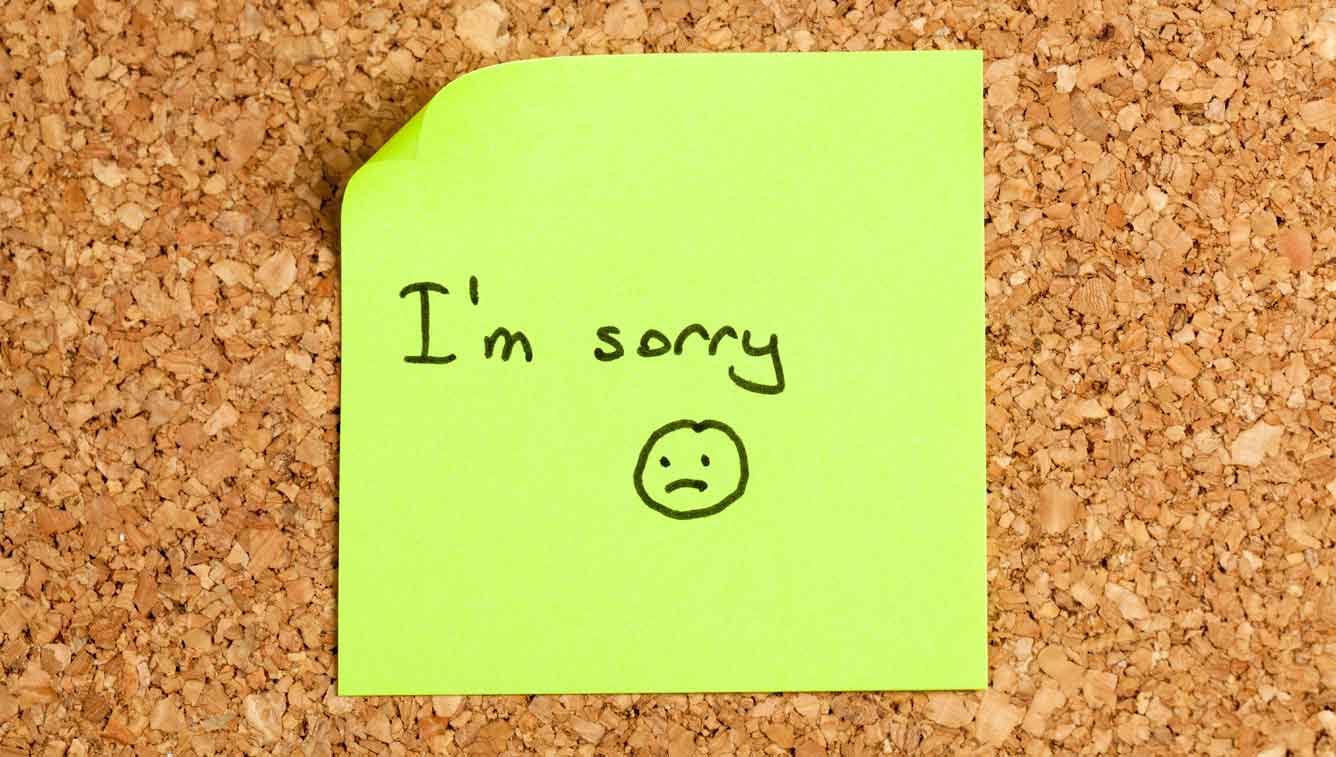How to say sorry
How to say sorry
35 Useful Ways to Say “I’m Sorry” in Writing and Speaking
How to say Sorry! List of different ways to say “I’m Sorry” in English you should know. Learn these synonyms for I’m sorry to improve your English speaking skill.
Learn more about how to make and accept an apology in English.
Table of Contents
Ways to Say I’M SORRY
How to say Sorry in English
Excuse me
“Excuse me” is a polite way of asking for forgiveness. If you commit a social crime like interrupting a conversation you may say “excuse me for interrupting” to show your adherence to social expectations. If unaware of the social indiscretion you committed you could apologize by saying “please excuse my ignorance”.
Beating yourself up
Sometimes people say “I’m sorry” by verbally beating themselves up. Using statements like “how stupid/careless/thoughtless of me” or “oh my goodness! I’m so sorry. I should have watched where I was going” expresses condemnation for your actions.
I take full responsibility
Being direct and taking responsibility for your actions is a good way to say that you are sorry. Statements like “I wanted to tell you I’m sorry”, “sorry, it was all my fault”, “that was wrong of me”, “sorry about that”, and “that’s my fault” show accountability.
Admitting mistakes
Sometimes people express mistakes without directly saying “I’m sorry”. They admit their failings by stating “I was wrong about that” or “I had that wrong”. In these instances, they imply that they are sorry.
I’m (so/very/terribly) sorry
So, very, and terribly are adverbs of degree. They express the intensity of your feelings of regret. Use degree adverbs when committing larger mistakes. Using these adverbs when apologizing for smaller mistakes seems over the top. In these situations, an apology can be read as sarcastic and insincere.
My apologies
Use my apologies when formally apologizing to co-workers in a business environment. Sometimes individuals utter my apologies when greeted with solicitations that they must decline.
Do not insert “my apologies” or “ever so sorry” into a conversation in a relaxed setting. Using a formal apology in this setting can give off a sarcastic vibe. They come to mean the opposite of the thought you initially wanted to express.
Stating “Sorry, my apologies. I had that wrong.” is another way to formally express regret for a mistake in a business setting. In addition, “I apologize”, “I want to apologize”, “I owe you an apology”, “I sincerely apologize”, “Please accept our (sincerest) apologies”, “I’d like to apologize for how I reacted yesterday”, and” I’d like to apologize” all indicate regret in a formal manner.
Oh, my bad/My mistake/My fault, bro (US)
Employ any of the above slang expressions when you commit any tiny infraction in a casual setting. You can say “oh, my bad” to take responsibility for missing a shot on the court or for bumping into someone.
Please don’t be mad at me
Instead of uttering apologies, some people communicate regret by asking for your generosity and forgiveness indirectly. “Please don’t be mad at me” expresses regret for the consequences of an action indirectly.
Whoops! Sorry!
People often exclaim “Whoops! Sorry” when they want to acknowledge a small faux pas they made in a social setting. You can often hear this expression uttered when someone spills a drink. People utter this expression when apologizing for small infractions that have no long-term consequences.
I beg your pardon
“I beg your pardon”, “pardon me”, “pardon” or “pardon me for being so rude” are all ways you can ask another person to excuse your behavior or mistake. When used as a verb “pardon” means courtesy, but when used as a noun “pardon” demands forgiveness.
Forgiveness appeals
Asking for forgiveness is another way that people communicate that they are sorry. “I was wrong. Can you forgive me?” and “I hope you can forgive me.” are examples of how asking for forgiveness can equal “I.m sorry”.
Synonyms for I’m sorry
List of 35 other ways to say I’m sorry in English.
How to say sorry
By Emily Hitz, PhraseMix.com contributor
Knowing how to apologize is an important part of being polite. You probably already know «sorry», but there are many other ways to apologize in English.
Apologizing for small mistakes
Simply saying «sorry» is most common with small mistakes, like bumping into someone or saying someone’s name wrong. In these situations, people often say:
There are a few slang phrases that you can also use for slight mistakes:
In a very informal text message, a young person might even abbreviate «sorry»:
sry, cant. busy.
Apologizing when you make a more serious mistake:
For a more serious mistake, especially in customer service situations, you might say:
Sometimes people say «oh my goodness» or «oh my gosh» before they apologize in these situations:
Oh my goodness! I’m so sorry. I should have watched where I was going.
Apologizing for incorrect information
If you cause a problem with communication, or give incorrect information, you might say:
I had that wrong.
I was wrong on that.
Sometimes you can say two of these phrases together, and you can say «sorry» at the beginning or end:
Sorry, my apologies. I had that wrong.
Making a formal or serious apology
If you make a serious mistake with a friend, loved one, or coworker, you shouldn’t use casual language to apologize. Try a more formal apology, such as:
I’d like to apologize.
I want to apologize.
I wanted to tell you I’m sorry.
After these phrases, you can add «for (doing something/ how I… / what I…)»:
I’d like to apologize for how I reacted yesterday.
If you want to, you can also say:
I hope you can forgive me.
. if you’re very serious about your apology.
Writing a formal apology
We use the most formal English in writing. In this situation, you could use these phrases:
I sincerely apologize.
You may want to complete the sentence with one of these phrases:
. for any problems I may have caused.
Other contexts for ‘sorry’
There are a few situations where English speakers (especially Canadians) say sorry, but they aren’t really apologizing. For example, when you need to pass someone in a crowded place, it’s common to say sorry, but you can also say:
You can also use «Sorry?», «Excuse me?», and «Pardon?» (or «Pardon me?») to ask someone to repeat what they said. In this case, you should use a rising question intonation.

How to say sorry
Have you ever tormented yourself about how to apologize and have your apology accepted? It’s hard even in your mother tongue. But when it comes to a foreign language, you need to be even more considerate and attentive. Just learning to say “sorry” in Russian culture isn’t enough; even your gestures and behavior matter when it comes to apologizing, in any language. So, let’s learn how to say “Please, forgive me” in Russian and be on top in any situation. Start with a bonus, and download your FREE cheat sheet – How to Improve Your Russian Skills! (Logged-In Member Only)
1. Body Language for Apology
Russian people don’t differ that much from European people when it comes to body language during an apology. So once you’ve found the best way to say “sorry” in Russian for your situation, you can apply the following body language tips to add sincerity and depth to your apology.
If the situation isn’t very formal or serious, you can look into the other person’s eyes. However, this may not be the best approach if you’re late for a job interview.
Looking down during the apology will make it deeper and more sincere.
2. The Main Words to Say “I am Sorry” in the Russian Language
There are two commonly used verbs for an apology in the Russian language: Извинить (Izvinit’) and Простить (Prostit’). Please, note that here these apology verbs are in the infinitive form, and to ask for forgiveness you’ll need to change it according to the situation, whether formal or informal. We’ll learn more about this later on in the article. Both of these words can be used in both kinds of situations. You can choose either one for your apology. The difference is very vague, and not every Russian can define it.
Let’s try to feel the difference between these two words for the official phrase “Sorry to trouble you.” If you use the verb Извинить (Izvinit’) then the formal phrase will be: Извините за беспокойство (Izvinite za bespokoystvo). You can use it during a call when you formally apologize that you’re distracting another person from his work.
If you use the verb Простить (Prostit’) then the formal phrase will be: Простите за беспокойство (Prostite za bespokoystvo). It sounds more sincere, such as when you really understand that you’ve distracted the person from doing some important job and feel sorry for that.
3. Formal Apologies
So, as said, Извинить (Izvinit’) and Простить (Prostit’) are the main apology words. This is how they’re transformed for an apology in a formal situation:
You can use these words just like that. But if you add the reason why you’re sorry, it’ll sound more polite and sincere.
Also, your apology will sound more polite if you add Пожалуйста (Pozhaluysta) or “Please” to it. For example, Извините, пожалуйста, что отвлекаю, но вас вызывает начальник (Izvinite, pozhaluysta, chto otvlekayu, no vas vyzyvayet nachal’nik) means “I’m sorry to interrupt, but the boss is calling for you.”
4. Informal Apologies
This is how the main apology words Извинить (Izvinit’) and Простить (Prostit’) look like in an informal situation:
So, “Sorry, comrade” in Russian translates to Прости, друг (Prosti, drug).
You can also add Пожалуйста (Pozhaluysta) meaning “Please,” or the reason, or even address the person. For example:
There’s an interesting informal apology when you refer to yourself in the third person. Though it’s rarely used nowadays, you can find it a lot in books, films, and series:
You can add some phrases after the main apology to make it stronger:
5. Peculiar Apologies
Of course, some people get bored with the more popular apologies and find ways to sound more original when apologizing. Most of these should be used in informal situations:
6. How to Reply to an Apology in Russian
1- General Answers
2- Informal Answers
7. Conclusion
As you can see, there are a lot of ways to say “I apologize” in Russian, but 90% of all apologies include either the word Извинить (Izvinit’) or the word Простить (Prostit’). Make sure to remember how these infinitives change in formal and informal apologies. For formal ones, use Извините (Izvinite)—“Sorry” and Простите (Prostite)—“Sorry.” For informal ones, use Извини (Izvini)—“Sorry” and Прости (Prosti)—“Sorry.” Once you feel comfortable using these common Russian “Sorry” words, choose some other apologies and learn them to expand your vocabulary and impress your Russian partners and friends.
The wide range of Russian apologies can be confusing at first, especially if you’ve just started to learn the language. Consider taking some lessons in our MyTeacher program for Russian-learners to get a great head start and save time by minimizing study efforts. With the help of our teachers, you’ll improve your Russian language skills in no time and start to sound like a real Russian very soon.
Увидимся! (Uvidimsya!)—“See you!”
Saying Sorry in English: Essential Phrases for Perfect English Apologies
Oh no, I did something wrong.
I wish I hadn’t said that.
I feel really bad about what I did.
All of us have felt bad about something we did or said.
Wouldn’t life be so much easier if it came with an “undo” button?
Unfortunately, we can’t change the past. We have to live with the consequences (results or effects) of our previous choices.
But there’s a magic word that we can use to make things a little better.
Can you guess what it is? (Hint: It’s only five letters long!)
Yes, you’re right. It’s “sorry.”
Learning to say sorry in English is essential to speaking polite English. It’ll help you in personal relationships as well as professional ones. Keep reading to learn essential phrases, tips and tricks for saying sorry in English.
Download: This blog post is available as a convenient and portable PDF that you can take anywhere. Click here to get a copy. (Download)
Saying Sorry: The Absolute Basics
Saying “sorry” means we admit our mistake (whatever we did wrong) and take responsibility for our actions. It means we’ve done something bad and now we’re trying to do better.
I’m sorry for hurting your feelings. I promise I will not be mean to you again.
We also say “sorry” when we’re feeling really bad about someone and we want to show that we understand and care for their feelings.
I’m really sorry to hear that you lost your job.
The word “sorry” is used in many situations.
Also, depending on what we did and who we’re speaking to, the way we apologize (say sorry) changes.
Common Vocabulary Words for Saying Sorry
Sometimes, just saying sorry isn’t enough.
There are specific words and phrases we can use to express or explain our feelings.
I’ll be using them in this post, so first let’s learn some of the most important words related to saying sorry:
Apologize (verb): To say sorry.
Regret (noun or verb): The horrible feeling when we wish that we hadn’t done a certain thing.
I have lots of regrets about the way I acted. (Noun)
I regret signing up for that stressful job. (Verb)
Apologetic (adjective): Showing regret for something you’ve done.
She was really apologetic about shouting at you in the meeting.
Ashamed (adjective): Feeling really bad or embarrassed about past actions.
I am ashamed of how hurtful I was to my sister.
Remorseful (adjective): The painful awareness of our wrongdoing. Similar to “ashamed.”
After fighting with his best friend, he was remorseful about the way he had treated her.
Fault (noun): A flaw or an error. When used with a personal pronoun like “my” or “your,” it means taking responsibility for your actions or assigning blame.
It was my fault that we arrived late, and I’m sorry.
I’m sorry we’re late, but it was her fault, not mine.
Mistake (noun): Any error or misunderstanding. We frequently use the word “mistake” with the verb “make.”
I made too many mistakes, so we failed the group project.
Forgive (verb): To stop feeling angry or upset at a person who did something bad.
I don’t know if I can forgive her yet.
Quick Tips for Sincere Apologies
Saying sorry won’t fix a problem immediately. An apology isn’t a good apology until you mean it and you really want to do better. Here are some quick tips for sincere apologies in English:
Saying Sorry in English: Essential Phrases for Perfect English Apologies
As I’ve mentioned before, saying sorry depends on context.
In other words, apologizing is different depending on the situation. Did you really make somebody feel bad, or did you make a very small mistake, like bumping into somebody at the store? Are you talking to a boss, or are you talking to your best friend? Did you make a mistake, or are you offering comfort?
All of these things will impact how you say sorry.
I’ve included many different phrases that can be used in each of these situations.
Check out my examples. Pay special attention to the phrases in bold. These are the essential (most important) phrases you need to learn to say sorry.
To get you started, check out the video below, which gives a helpful overview of the different ways to use sorry in English with explanations, context-specific examples and native clips.
Saying Sorry When You’ve Done Something Wrong
Very often, we make major mistakes or we mess up.
Some of these mistakes might be deliberate—that is, done on purpose. (Perhaps you got angry at a coworker, so you took something from their desk.) Some mistakes could be accidents or misunderstandings.
But either way, if the mistake was your fault, you should own up to it (accept responsibility) and apologize.
I’m so sorry. I was incorrect.
I apologize for my mistake. I should have been paying more attention.
That was wrong of me. I promise I will never do it again.
I messed up and I’m sorry. I will try to do better next time.
Saying Sorry When You’ve Hurt Someone’s Feelings
All our actions have consequences and affect people around us.
Sometimes what we say or do can upset people.
In such cases, it’s important to apologize as well as to ask for forgiveness. You can also ask what you can do to make the other person feel better.
I’m very sorry for forgetting the groceries. Please don’t be mad at me.
I didn’t mean to hurt you but I’m sorry I did. Will you please give me another chance?
I’m sorry. I shouldn’t have said that.
I’m filled with remorse for what I did last night.
It was my fault that I lost my temper. Will you please forgive me?
I’m so sorry. I’m ashamed of lying to you.
I’m sorry. Is there anything I can do to make this up to you?
I truly regret what I did.
Saying Sorry When You’ve Made a Small Mistake
Not all of our mistakes are big. Bumping into someone in a store or stepping on someone’s toes when you’re in a hurry are minor mistakes. They might happen when we’re careless or distracted.
However, we should still apologize in these situations.
Here are some simple phrases for small mistakes. Remember to say these phrases with a smile and a cheerful tone:
Oh, sorry! I didn’t see you there! (Used when you step on someone’s toes or bump into someone)
Sorry about that!
Sorry, it was an accident!
Sorry, I didn’t mean to do that!
Saying Sorry When You Want to Express Sympathy for Others
Saying sorry isn’t just for when you make a mistake.
We also say it when we want to sympathize with others. In other words, we say sorry to show that we understand and care about our family members, friends or acquaintances when they experience difficulties.
Here are some phrases you can use to sympathize with someone:
I’m so sorry to hear about your break-up. How are you coping now that she has left?
I’m sorry that this happened to you. It must have been so terrible. No one should have to go through that.
I’m very sorry. I’ve been through this and I understand how you feel.
I cannot express how sorry I am to hear about this.
I’m really sorry to hear that you lost your job. I’m here for you if you wish to talk about it.
However, if the context is the death of someone, we usually use the phrase “my condolences.”
I’m sorry to hear about your father. My condolences. He must have been a great man.
Saying Sorry When You’re Trying to Get Someone’s Attention
In certain cases, you can use “sorry” to get someone’s attention. This is useful when you need somebody to repeat something, or when you need somebody to move.
Sorry, could you please repeat what you said?
Sorry, could you move over a bit so I can get through?
Sorry, could you pass me my jacket?
In these situations, we can also use words like “pardon” or “excuse me.”
Pardon? Could you repeat that?
Excuse me, can you pass me the salt?
Bonus Phrases: Saying Sorry in Special Situations
So far, I’ve talked about some of the most common situations where we need to apologize.
Now that we’ve covered the basics of saying sorry, let’s look at some more advanced phrases that native speakers might use. These are some phrases you might use in very informal situations (such as talking to a close friend), or very formal situations (such as a professional email).
Saying Sorry in Very Informal Situations
The way we apologize to a stranger is different from the way we speak to a close friend.
In fact, when it comes to casual situations with friends, we often use informal or “slang” language. These terms are especially good for talking about small mistakes.
My bad, I forgot to bring the book.
Oops, sorry!
How silly/careless/stupid of me to say that!
I goofed, sorry!
Whoops!
Sometimes, if we’re texting with friends, we can shorten the word “sorry” or modify the spelling.
Sry. See ya soon! (Sorry. See you soon!)
Saying Sorry in Formal Situations
Apologies are really important in crucial situations, such as the workplace or an official environment.
For instance, employees may have to apologize to their bosses, either in writing or in person, if their work isn’t good enough. Or, workers may have to say sorry to customers or clients when something goes wrong.
In these cases, it’s best to use formal phrases. For example:
I would like to sincerely apologize for my mistake.
My apologies. I take full responsibility for that failure.
I owe you an explanation for my disappointing behavior.
In a professional email, you can use phrases that are even more formal. For example:
Please accept my sincerest apologies regarding…
Please accept this as my formal apology for…
Allow me to apologize on behalf of the entire company.
It’s really uncomfortable when you know you’ve done something wrong, but you don’t know the right words or phrases to admit your faults.
After reading this, you’ll never feel that way again!
Now, you know how to say sorry in any situation. Try practicing the above words and phrases by saying them out loud in front of the mirror.
If you’re unsure of how to pronounce certain words, look them up in an online dictionary. And remember, an apology isn’t an apology until you mean it. So try to be as sincere as you can, and keep practicing until you get it right!
Archita Mittra is a freelance writer, journalist, editor and educator. Feel free to check out her blog or contact her for freelancing/educational inquiries.
Download: This blog post is available as a convenient and portable PDF that you can take anywhere. Click here to get a copy. (Download)
Popular Posts
Categories
About FluentU
FluentU brings English to life with real-world videos.
Learning English becomes fun and easy when you learn with movie trailers, music videos, news and inspiring talks.
FTC Disclosure
FluentU is a participant in the Amazon Services LLC Associates Program, an affiliate advertising program designed to provide a means for sites to earn advertising fees by advertising and linking to Amazon.com. Amazon and the Amazon logo are trademarks of Amazon.com, Inc, or its affiliates. We also participate in other affiliate advertising programs for products and services we believe in.
© 2022 Enux Education Limited. All Rights Reserved.
Enter your e-mail address to get your free PDF!
We hate SPAM and promise to keep your email address safe
How to say sorry in English
There are many different ways to say sorry in English. Discover some of the most common phrases and expressions to express your apologies as below.
Apologies Expressions
To accept an apology, you can use these sentences and expressions:
Download Full Lessons Package – Common English Expressions and Daily Use Sentences (mp3+pdf)
Listening is THE KEY to better English speaking. The more REAL English phrases and expressions you listen to, the more fluent you will become, to be sure.
For a small one-time investment, you can get the whole package of 50 lessons. Put it into your phone or MP3 Player and take your English learning ANYWHERE.
You can learn English on the bus while going to work. You can learn English while exercising or walking. You can learn English while shopping. You can learn English while sitting at a coffee shop, etc.
Remember, DEEP LEARNING is the No. 1 secret to English fluency. If you want to speak English fluently and automatically, you have to repeat the same lesson over and over again until you MASTER it.
WHAT YOU WILL GET:
Take advantage of your short free time during the day to do A LOT of repetition, and you will be amazed at how fast your English speaking improves. Get started today!
P/S: If you want to download more lesson packages with a discounted price, check out 0ur Resources Page here.










